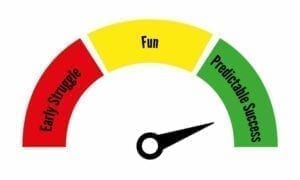The answer seems obvious. Who wouldn’t want to scale their company’s growth? Who wouldn’t want their company to grow as quickly as they would like? Who wouldn’t want the only limit on their size to be the size of their market?
It sounds like a dream, doesn’t it? It’s not a dream. It is a real, tangible, and healthy part of an organization’s growth cycle. One that, theoretically, an organization can stay in indefinitely. Les McKeown calls this Predictable Success.
However, very few companies are in Predictable Success, and many new businesses never make it into Predictable Success.
While there are several reasons for this, in this article I want to focus on the role of the visionary/founder/president/owner/CEO/whatever (I’ll shorten this to Visionary for simplicity’s sake) plays in getting the business into Predictable Success. We’ll discuss what it costs them and why not everyone chooses Predictable Success.
The Role of the Visionary
The Visionary brings vision and entrepreneurial spark to an organization of any size. They are why focused and future focused. Things like growth, culture, and client satisfaction tend to be top of mind.
The Visionary brings vision and entrepreneurial spark to an organization of any size. They are why focused and future focused. Things like growth, culture, and client satisfaction tend to be top of mind. Share on XEarly Struggle
Often the Visionary is the founder and is there from the very beginning. In the beginning, it is all hands on deck. This can be a Visionary’s dream. There are very few rules, and none of them apply to you! You see it, you take it, and you move on to the next thing. It’s fast, and it’s energizing for a visionary. It’s an all-out breathless race to the finish line, and every day is a fight for survival.
To get through Early Struggle, the Visionary needs an Operator. Operators don’t tend to move quite as fast as the Visionary. They don’t usually do things the same way as the Visionary. Operators need to finish things while Visionaries are often content to start things. For some Visionaries, these differences can feel like too much.
In the early days of this adrenaline-filled phase, the Visionary was as free as the west was wild. Sometimes Visionaries can get stuck here. They may believe they need the pressure. They may want to retain all the control. In either case, staying in this struggle for growth phase is never a good thing. When in Early Struggle, you should have only one objective: to get out of it and into Fun.
Fun
When the Visionary and Operator get into a rhythm, great things happen. The whole organization starts to grow, new customers come in, great work gets done, and the business bank accounts begin to climb upward steadily. This is Fun, and for the Visionary, they often feel more successful than they ever have before.
However, as success continues, the organization starts to feel the effects of growth, particularly when it fails to cope with the added complexity within the business. At the beginning of Fun, the Visionary owns the business, but by the time Fun is over, it feels like the business owns them. Les calls this time Whitewater.
Whitewater
Whitewater creates a question that the Visionary must answer eventually. Do you want to slow the growth and return to Fun, or do you want to scale the growth and take the organization to the next level?
If you are a Visionary and you feel like your organization is in Whitewater, there is one thing you need to know. The path to Predictable Success is in the opposite direction of the road back to Fun. Systems and processes and Processors pave the way to Predictable Success, and all of these will slow you down and may even make things worse before they get better.
By now, you may be able to understand better why some Visionaries choose to slow their growth and return to Fun. All those systems and processes are a big part of why they left and started the business in the first place.
As you look to the future, I’d like to encourage you to find the spot that you will enjoy the most.
If you love the Early Struggle, start quickly, and then sell fast and start again.
If you love the autonomy and ease of Fun, then stay there. Turn the dials back just enough to keep the complexity at bay, and you’ll be able to enjoy the ride for the long haul.
If your ready to see all that your organization can become, then buckle up. The road to Predictable Success requires much change, but it comes with an excellent reward!
For more from Les, check out his books Predictable Success and The Synergist.
For help diagnosing what stage your organization is in, take this quiz and post your result in the comments below.




 Who is Better Than You?
Who is Better Than You?